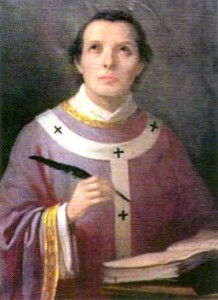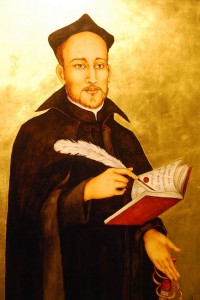Anselm of Canterbury

Feast Day: April 21
Canonized: 1492
Anselm’s desire to become a monk led him from his childhood home in Italy to a famous Benedictine monastery in France. He studied the great writers of the Church, including St. Augustine, and spent much of his time teaching and writing important books that explained some of the deepest mysteries of our faith. It is believed that Anselm gave us the term “theology” and defined it as “faith that is seeking to understand.” Anselm was also elected head of the monastery by his brother monks.
The pope appointed Anselm as England’s Archbishop of Canterbury. It was a very challenging assignment. The king, William II, wanted to be the one who appointed bishops and other Church officials. Anselm disagreed and was sent into exile. Anselm returned to England after William’s death, but the new king, Henry I, also wanted control over Church appointments. He, too, sent Anselm into exile. Eventually, Anselm returned, but he continued to make decisions based on his belief in Jesus and Church law.
Anselm fought against injustice. He opposed slavery and was responsible for a law being passed that forbade the selling of human beings. He organized efforts to care for poor people in England. Like Jesus, he was a true shepherd of his people. He listened to their problems and answered their letters with loving but firm advice.
The Church honors Anselm, who lived from 1033 to 1109, as both a saint and a Doctor of the Church. Doctors of the Church have been specially chosen by the pope as the greatest teachers of our faith.
We can pray to St. Anselm and ask him to help us grow in our love for the Lord. We can honor St. Anselm by listening carefully to the catechists who share their faith with us so that we can better understand what it means to be a Catholic in today’s world.
Connecting with Blest Are We® Parish and School
The Story of Our Church, unit 2




Comments are closed.